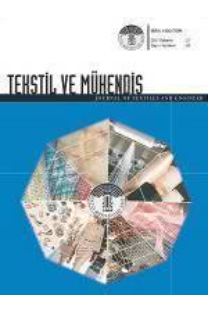Elektrik Alan ile Lif Çekimi Yöntemi ile Elde Edilen Ligand Katkılı Poliüretan Nanoliflerin Morfolojik ve Lüminesans Özelliklerinin İncelenmesi
Elektrik alan ile lif çekimi, nanolif, ligand, lüminesans
Investigation the Morphological and Luminescence Properties of Ligand Doped Polyurethane Nanofibers Produced by Electrospinning
Electrospinning, nanofiber, ligand, luminescence,
___
- Kozanoğlu, G.S., (2006), Elektrospinning Yöntemiyle Nanolif Üretim Teknolojisi, Yüksek Lisans Tezi, İstanbul Teknik Üniversitesi Fen Bilimleri Enstitüsü, 5-59, İstanbul, Türkiye.
- Yang, H., (2007), Fabrication and Characterization of Multifunctional Nanofiber Nanocomposite Structures through Coelectrospinning Pocess, PhD Thesis, Drexel University, USA.
- Erdem, R., (2013) Nanolif Bazlı Yara Örtüsü Yüzeyi Geliştirilmesi, Doktora Tezi, Marmara Üniversitesi Fen Bilimleri Enstitüsü, 42-51, İstanbul, Türkiye.
- Demir, M. M., Yilgor, I., Yilgor, E., Erman, B., (2002), Electrospinning of polyurethane fibers, Polymer, 43, 3303–3309.
- Huanga, Z.M., Zhang, Y.-Z., Kotaki, M., Ramakrishna, S., (2003), A review on polymer nanofibers by electrospinning and their applications in nanocomposites, Composites Science and Technology, 63, 2223–2253.
- Bhardwaj, N., Kundu, S. C., (2010), Electrospinning: A fascinating fiber fabrication technique, Biotechnology Advances, 28, 325–347.
- İlhan, M., (2014), Synthesis, structure and photoluminescence properties of Ho3+ doped TTBeBaTa2O6 phosphors, Solid State Sciences, 38, 160-168.
- Zhu, Y., Chen, Z., Ge, M., (2014), Preparation of Sr2MgSi2O7:Eu2+, Dy3+nanofiber by electrospinning assisted solidstate reaction, Journal of Materials Science: Materials in Electronics, 25, 2857–2862.
- Cheng, Y., Zhao, Y., Zhang, Y., Cao, X., (2010), Preparation of SrAl2O4:Eu2+, Dy3+ fibers by electrospinning combined with sol–gelprocess, Journal of Colloid and Interface Science, 344, 321–326.
- Zhang, H., Song, H., Dong, B., Han, L., Pan, G., Bai, X., Fan, L., Lu, S., Zhao, H., Wang, F., (2008), Electrospinning preparation and luminescence properties of europium complex/polymer composite fibers,The Journal of Physical Chemistry C, 112, 9155– 9162.
- ISSN: 1300-7599
- Yayın Aralığı: Yılda 4 Sayı
- Başlangıç: 1987
- Yayıncı: TMMOB Tekstil Mühendisleri Odası
SÜPERHİDROFOB TEKSTİL YÜZEYLERİN FLORSUZ BİLEŞİKLER KULLANILARAK SOL-JEL YÖNTEMİ İLE MODİFİKASYONU
YAŞAR ERAYMAN YÜKSEL, YASEMİN KORKMAZ
Yüksek Performanslı Kumaş Zırhların Balistik Dayanımlarının Sayısal Olarak İncelenmesi
Yüz Yüze Dokuma Halılarda Hav Yüksekliğinin Halıların Bazı Mekanik Özelliklerine Etkisi
Süperhidrofob Tekstil Yüzeylerin Florsuz Bileşikler Kullanılarak Sol-Jel Yöntemi ile Modifikasyonu
Yaşar ERAYMAN, Yasemin KORKMAZ
YÜZ YÜZE DOKUMA HALILARDA HAV YÜKSEKLİĞİNİN HALILARIN BAZI MEKANİK ÖZELLİKLERİNE ETKİSİ
YÜKSEK PERFORMANSLI KUMAŞ ZIRHLARIN BALİSTİK DAYANIMLARININ SAYISAL OLARAK İNCELENMESİ
Aslıhan SAYILAN, Özge KAYNAN, Aynur YUSİFOVA, Hülya CEBECİ, Elif ÖZDEN YENİGÜN
Büküm İplikçiliği (Siro-Spun) Teknolojisindeki Gelişmeler ve Hibrit Eğirme Teknolojileri
